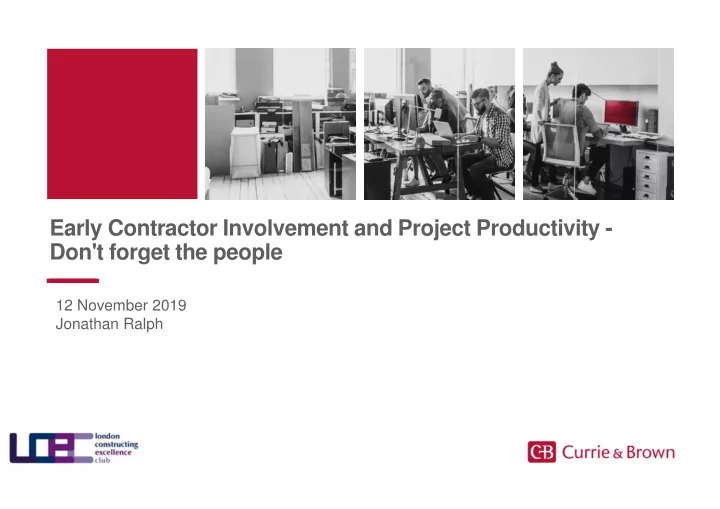

Early Contractor Involvement and Project Productivity - Don't forget the people 12 November 2019 Jonathan Ralph
A little about me… Jonathan Ralph Consultant with Currie & Brown Chartered quantity surveyor 30 years in construction 29 years with contractors 15 years’ commercial leadership in complex multidisciplinary major station redevelopments St Pancras King’s Cross Northern Ticket Hall Blackfriars London Bridge 2 www.curriebrown.com
Productivity in construction Consensus, consensus and more consensus 3 www.curriebrown.com
The impact of poor productivity Client: Funding uncertainty Contractor: Margin instability 4 www.curriebrown.com
How does this play out on projects? Cost growth modelled from recent major station redevelopment Completion Commence construction Award 120% 100% 100% Representation of industry productivity challenge Commence Completion construction Award Design/procurement Construction period 90% ‘ Build to budget ’ 100% ‘ Design to budget’ 80% 5 www.curriebrown.com
How is the industry responding? One strategy is the advent of early, early contractor involvement Encompasses services traditionally undertaken by consultants Contractors move further into an environment that is not business as usual 6 www.curriebrown.com
Expected result…and the likely Improved team working with integrated contractor and designer Develops greater understanding of requirements Improved support of stakeholder management, contractor, designer and key supply chain innovation Enables companies to plan for the recruitment, training / and retention of personnel Appoint key supply chain partners; and source long-lead / items Reduced cost 7 www.curriebrown.com
Reality of ECI phases Time pressure Key staff availability Staff populated by availability, not necessarily suitability Exposes lack of standardised process and procedure Late supply chain mobilisation Behaviours – ECI a hurdle to get to construction ECI = value engineering Project management/Margin protection strategy is a low priority 8 www.curriebrown.com
Why don’t contractors focus on protecting tendered margin? Investment in tendering not delivery Client behaviour No incentive to invest in lessons learnt Optimism bias Moving risk down the supply chain Disproportionate focus on the technical engineering challenge Every project is unique but the problems are the same Why, when the business is full of professionals/experts? 9 www.curriebrown.com
So how do we get improvement in project delivery? Procurement for value Presumption for off-site Embracing new technology and digitisation …there is one missing ingredient in the mix: people 10 www.curriebrown.com
What about the people? Constructing Excellence Productivity Workshop (25/10/19) results Importance of the four pillars of productivity improvement Technology Process and methods Organisation People 0% 10% 20% 30% 40% 50% 60% 70% Critical Important Moderately Important Little Importance Unimportant 11 www.curriebrown.com
How are people considered? Everyone is a professional Investment in apprentices Culture of fear – industry works very hard to discourage innovation Pride in crisis recovery creates a self-fulfilling prophecy Absence of thinking time ...low and behold you get what you’ve always got 12 www.curriebrown.com
The future What is it going to take to create the future state? 13 www.curriebrown.com
Future state productivity model The future state model is Disciplines: based upon the modelling of a likely project outcome Design management Project controls based on a set of key discipline and/or trade Procurement Commercial management problem statements using: Preliminaries Risk opportunity Experiential major Handback Change management and estimating infrastructure learning Superstructure Independent commercial Extensive benchmarking Fixtures, fittings and assurance equipment data Stakeholder management MEP HSE Planning Sustainability Supply chain management Quality 14 www.curriebrown.com
Future state productivity model Problem Stage Owner Validation statement(s) Discipline is Senior leadership Apply historic data to 1. Remove the consistently over team determine the cost optimism bias budget Discipline exceeds Apply data to map the budget because current state 2. Refine the Discipline leads 1…….. 1………. challenge 2………… 2………. 3………. 3………. Develop innovative Cost/benefit analysis solutions revert to SLT for approval 3 Create the Specialist team(s) 1…….. 1………. future state 2………… 2………. 3………. 3………. 15 www.curriebrown.com
Future state productivity model Step 3: Creating the future state Specialist team Form the specialist team, undertake a detailed data analysis of the target statement, develop the solutions, produce a cost benefit analysis, submit to SLT for approval. Lesson learnt Other projects Future thinking Risk/ opportunity Intellectual ref’s fixed/ variable Vertical groups cost Innovation Create future Develop Cost /benefit SLT approval/ Mapping the solution(s) analysis state model mobilisation Data analysis current state Supply chain partners Assessment Specialist KPI’s/dashboard team selection Tier 2/3 suppliers Attitude to Innovation Off-site manufacture 16 www.curriebrown.com
Future state productivity model Model was developed as an ECI and construction phase tool Don’t try to eat the whole elephant - keep investment low and provide controlled incremental benefits Offers a combined commercial and business improvement process 17 www.curriebrown.com
Contractors - ready, willing or able? To move forward you have to be willing to recognise and accept your frailties The concept of projecting your best self in work winning doesn’t encourage weakness, it values historic performance Moving into ECI clients requires the contractor to deliver the tendered vision If the client is collaborative, clear in its vision with shared risk and outcome there will be improvement but not of the magnitude to deliver the required improvements in productivity 18 www.curriebrown.com
The outlook Exciting time on the cusp of massive change Timeline is uncertain More will fall and some will succeed Agility and resilience is key for all - individuals/consultants/contractors 19 www.curriebrown.com
Questions and answers These are my views based upon my experience and I welcome your views and challenges 20 www.curriebrown.com
Recommend
More recommend